Objectives: The overall objective of this year’s fieldwork is to mobilize the knowledge produced by the women and girls with disabilities in the TDKRA project to their local and transnational communities. Our specific objectives included:
- To engage women and girls with disabilities in the three piloted areas in mobilizing their knowledge on their right to inclusion;
- To engage local communities and policymakers in the global South in building inclusive communities by working with girls and women with disabilities;
- To mobilize the Disabled People Organization’s (DPO) leadership and advocacy;
- To engage universities in the global North in learning from and with the women and girls with disabilities, alongside their communities in the global South
- To involve disability activists, graduate, and undergraduate students in Canada in the knowledge mobilization (KMb) activities.
Activities: Our participatory activities included:
- Discussing how to use the works of participants such as a documentary film, and a catalogue consisting of drawings and photos as a means to mobilize their knowledge.
- Election – voting for disabled women and girls’ representatives for each group
- Building messages about the women and girls with disabilities’ leadership with their portraits through “I Am A Leader Because…” activity
- Creating action plans through a social media platform
- Involving community members and policymakers in dialogues through the exhibition and documentary film.
Methodologies: TDKRA is a participatory research project with a paradigm that is grounded in the values of the community (Nguyen, Stienstra, Gonick, Do, & Huynh 2019). It aims to contribute something of value to the community in which the research is conducted (Kirby, Greaves, & Raid, 2006). The engagement of researchers and practitioners in the global South and North, along with women and girls with disabilities in Vietnam, open up difficult conversations about implicit assumptions and practices that guide research and shape how and whose knowledge is reflected in the work. This community-engaged research paradigm is particularly useful for disability research in the global South, as it enables a mutually beneficial dialogue between researchers and participants in ways that value the participants’ voices and perspectives. (Nguyen, et al., 2019).
Procedures: The July 2019 Fieldwork took place from July 15-26 in Can Tho, A Luoi (province: Thua Thien Hue) and Bac Tu Liem (province: Hanoi). In general, the first two days aimed to discuss what approaches were to be used to engage with community members and policymakers by using their works to mobilize their knowledge. The main goal of day 3 was to mobilize knowledge based on what the girls and women shared through the journey engaging with the TDKRA project, to change knowledge and action of their communities regarding disability.
A workshop was named “Knowledge Mobilization with Girls and Women with Disabilities” that was held in Can Tho and A Luoi to create dialogues based on the local community. In Hanoi, the national workshop “Dialogues on Inclusion from Perspectives of Women and Girls with Disabilities in Vietnam” took place in the collaboration with the DPO Hanoi. Participants of these workshops included girls and women with disabilities, government officials, other organizations related to children and people with disabilities, and Agent Orange victims, school representatives, parents of children with disabilities, NGOs (UNICEF, UNDP, Girls rising, etc.), as well as community members.
On day 1, the girls and women reflected on the documentary film “Our Journey”, and the catalogue “Envisioning Inclusion” to discuss the use of tools to mobilize their knowledge. They defined who would be the audience and what outcomes they expected from the community engagement workshop on the last day. We also elected the representative of the group to give the lead to the participants as a way to empower them. The elected girl and women expressed their opinions and decided the number of members to participate.
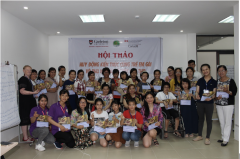
Image 1: A group shot of the TDKRA members in Can Tho with catalogues, Can Tho, July 2019 Fieldwork
On day 2, the participants drew self-portraits and wrote the response for the statement “I Am a Leader Because…”. They then went on to do a mini exhibition amongst themselves and discussed ‘leadership,’ as seen in image 2.
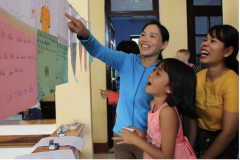
Image 2: The participants view “ I Am A Leader Because…” exhibition, A Luoi, July 2019 Fieldwork
On the last day, the local (in A Luoi and Can Tho) and the national (in Hanoi) workshops took place. To start, we opened an exhibition about leadership and inclusion with the collection of drawings and photos divided into 5 main topics: engagement spaces, participation, views of the girls and women with disabilities (relating to specific themes such as barriers/discrimination/marginalization, inclusion, engagement, hopes and cultural identity), and what it is like to be a girl with disabilities, and disability activism. Another part of the exhibition were the portraits of all participants with their messages produced from “I Am a Leader Because…” activity. Each group of women and girls with disabilities presented their posters to the audience, as seen in image 3. Through the exhibition and documentary film, the day continued with two dialogues for the audience to express their feelings, thoughts, and responses for what the girls and women had shared. The final activity of the workshop was to engage the audience by answering the big question, asked by the women and girls: “How do the community listen to girls and women with disabilities?”
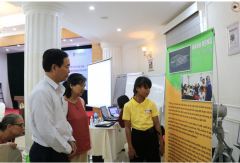
Image 3: The ethnic girl in A Luoi presenting a poster to the representatives from National Committee on Disabilities and the DPO Hanoi, Hanoi, July 2019 Fieldwork
Outcomes:
- Within 3 years of the participatory engagement process, the girls and women with disabilities participated in several activities, and created many works to share their experiences of inclusion and exclusion in their community. Mobilizing their knowledge played a critical role in creating social changes in their community. The activism of women and girls with disabilities partly shaped the community’s thinking as they wanted to be known. The girls and women reflected and discussed about their messages of their wants for inclusive society through their works.
- Reflecting on mobilizing their knowledge to community by using their works, the participants expressed their perspectives effectively. For example, through “I Am A Leader Because…” activity was a way to let the participants ponder on their capabilities and come up with their answers, to foster their leadership and to eventually empower them to be a leader with a disability.
- The girls and women expressed their strengths in the setting of the workshop for community engagement. In preparation for the workshop in A Luoi, for instance, we decided to let the candidates vote, to choose an MC among the 4 girls and women who wanted this position. After each candidate presented to the group as to why they should be the MC, a ten-year-old girl in A Luoi was elected, which was an important moment for her as this was her first time being elected as an MC. She demonstrated her dedication to her work with the help of the other girls and women (seen in image 4).
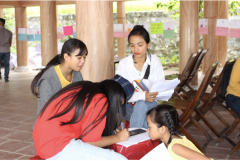
Image 4: The women and girls are preparing for the script as soon as the workshop begins, A Luoi, 2019
- The girls and women shared a lot about how they changed and how they were empowered by sharing their stories and experiences before and after the TDKRA project. They showed their capabilities and became confident in showing who they are and what they wanted other people to know about them by sharing their stories and perspectives in the community.
- The DPOs successfully organized the workshops through their network of policy makers, local authorities, government officers, NGOs specific to the disability sector, girls and women activists, school representatives, and parents of children with disabilities. The audience worked together with the girls and women to come up with solutions to promote the sustainability of the TDKRA project for the general disabled community and the participants of the project.
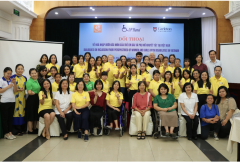
Image 5: A group shot of everyone taken at the national workshop held in Hanoi, July 26th, 2019
References
Kirby, S. L., Greaves, L., & Reid, C. (2006). Experience research social change: Methods beyond the mainstream. Toronto: University of Toronto Press.
Nguyen, X. T., Stienstra, D., Gonick, M., Do, H., & Huynh, N. 2019. Unsettling research vs. activism: How might critical disability studies disrupt traditional research boundaries? Disability and Society, Special themed issue on Disability, Activism and the Academy.